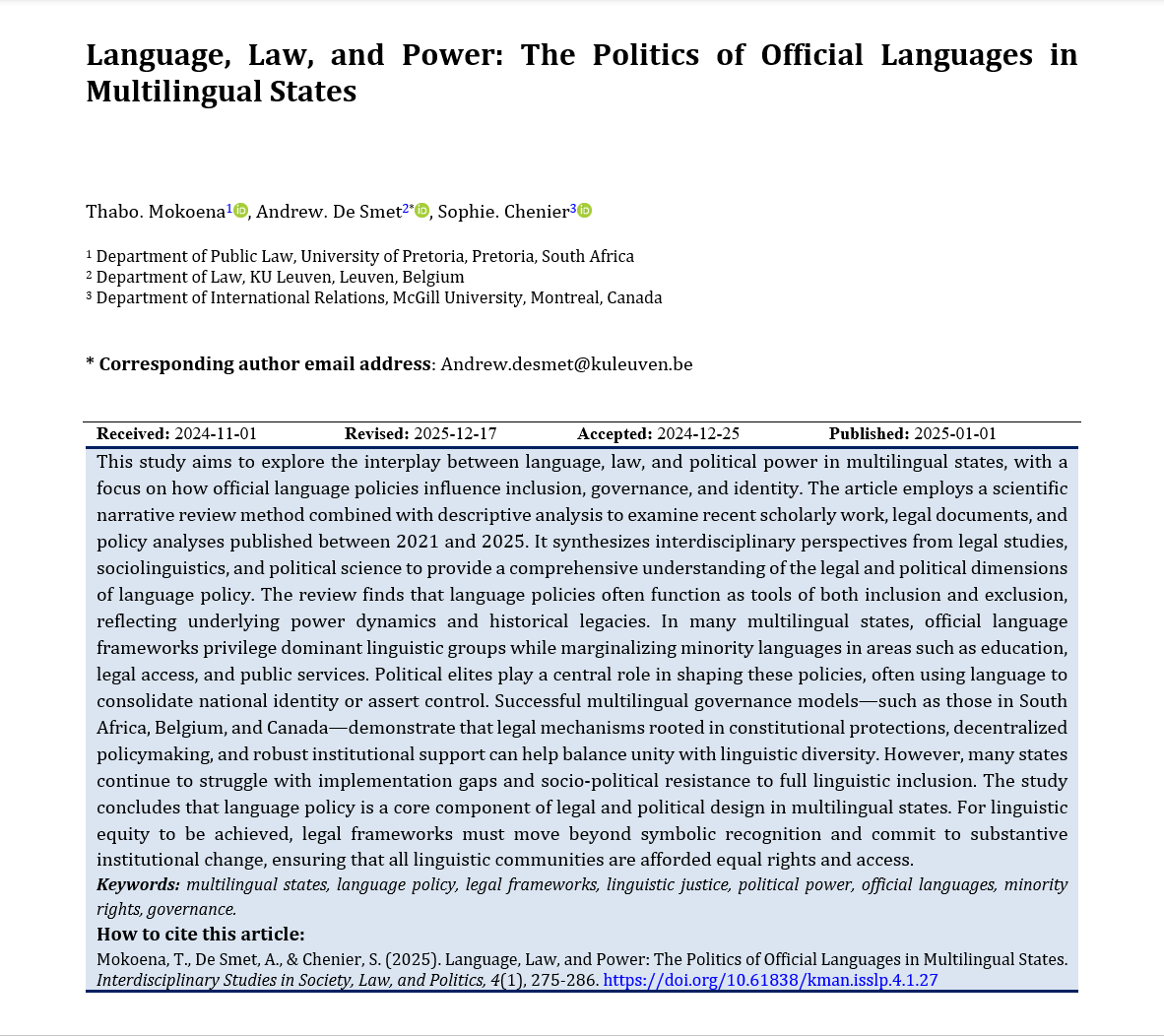Language, Law, and Power: The Politics of Official Languages in Multilingual States
Keywords:
multilingual states, language policy, legal frameworks, linguistic justice, political power, official languages, minority rights, governanceAbstract
This study aims to explore the interplay between language, law, and political power in multilingual states, with a focus on how official language policies influence inclusion, governance, and identity. The article employs a scientific narrative review method combined with descriptive analysis to examine recent scholarly work, legal documents, and policy analyses published between 2021 and 2025. It synthesizes interdisciplinary perspectives from legal studies, sociolinguistics, and political science to provide a comprehensive understanding of the legal and political dimensions of language policy. The review finds that language policies often function as tools of both inclusion and exclusion, reflecting underlying power dynamics and historical legacies. In many multilingual states, official language frameworks privilege dominant linguistic groups while marginalizing minority languages in areas such as education, legal access, and public services. Political elites play a central role in shaping these policies, often using language to consolidate national identity or assert control. Successful multilingual governance models—such as those in South Africa, Belgium, and Canada—demonstrate that legal mechanisms rooted in constitutional protections, decentralized policymaking, and robust institutional support can help balance unity with linguistic diversity. However, many states continue to struggle with implementation gaps and socio-political resistance to full linguistic inclusion. The study concludes that language policy is a core component of legal and political design in multilingual states. For linguistic equity to be achieved, legal frameworks must move beyond symbolic recognition and commit to substantive institutional change, ensuring that all linguistic communities are afforded equal rights and access.
Downloads
References
Akintayo, O. T., Atobatele, F. A., & Mouboua, P. D. (2024). Navigating Multilingual Identities: The Role of Languages in Shaping Social Belonging and Political Participation. International Journal of Applied Research in Social Sciences, 6(5), 828-843. https://doi.org/10.51594/ijarss.v6i5.1105
Hassan, S., & Abduljawad, S. (2023). Institutionalization of Global English in Media in Multilingual Countries. International Journal of English Linguistics, 13(4), 59. https://doi.org/10.5539/ijel.v13n4p59
Jusufi, J. (2021). Multilingualism in Prizren, Language Use and Language Policy. European Journal of Language and Literature, 7(2), 55. https://doi.org/10.26417/382voa26o
Lam, J. F. I., & Ieong, W. I. (2022). Translanguaging and Multilingual Society of Macau: Past, Present and Future. Asian-Pacific Journal of Second and Foreign Language Education, 7(1). https://doi.org/10.1186/s40862-022-00169-y
Madonsela, S. (2023). Focusing on Education Through Multilingual Language Policy in South African Schools. Journal of Language and Cultural Education, 11(3), 58-66. https://doi.org/10.2478/jolace-2023-0027
Mari, N., Shirazi, S. K., & Memon, I. P. (2024). Quantitative Insights Into English Language Learning Attitudes of ESL Learners in Multilingual Classroom: A Case of Rural Sindh. CRSSS, 2(2), 476-496. https://doi.org/10.59075/39mn2156
Paudel, R. (2023). Multilingualism in Nepal: Challenges and Opportunities. J. Tilottama, 1(1), 100-113. https://doi.org/10.3126/jtilottama.v1i1.64559
Rozenvalde, K., & Lazdiņa, S. (2024). The Value of Language Skills in Latvia: From Socio-Economic Inequality to Multilingual Awareness. Sociolinguistica - International Yearbook of European Sociolinguistics / Internationales Jahrbuch Für Europäische Soziolinguistik, 38(1), 1-26. https://doi.org/10.1515/soci-2022-0037
Rozman, T. (2023). Odgovorno Z Jezikom – Družbena Vloga Jezikovnopolitičnega Portala. Teorija in Praksa, 281-294. https://doi.org/10.51936/tip.60.2.281
Ruda, O. (2022). Legal Status of the Ukrainian Language in the Local Government Bodies of Interwar Halychyna. Contemporary Era, 10, 69-80. https://doi.org/10.33402/nd.2022-10-69-80
Shohamy, E. (2022). Critical Language Testing, Multilingualism and Social Justice. Tesol Quarterly, 56(4), 1445-1457. https://doi.org/10.1002/tesq.3185
Гурський, І., & Білецька, І. (2023). Білінгвізм Та Соціально-Педагогічні Засади Мовної Політики У Сполучених Штатах Америки. Перспективи Та Інновації Науки(14(32)). https://doi.org/10.52058/2786-4952-2023-14(32)-138-148

Downloads
Additional Files
Published
Submitted
Revised
Accepted
Issue
Section
License

This work is licensed under a Creative Commons Attribution-NonCommercial 4.0 International License.





